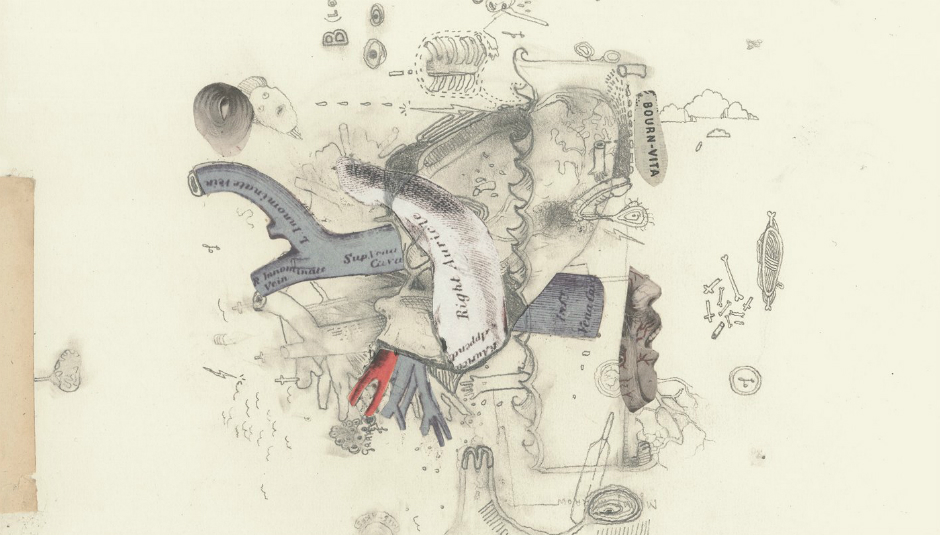There are some albums where, on first listen, you somehow know that it will become deeply significant to your life. A particular phrasing that perfectly encapsulates the essence of a thought, an instrumental breakthrough that swells through the body against its control, or simply a narrative that tells a starkly vivid story. The stories Frightened Rabbit chose to tell on
In the course of these 48 minutes and 14 songs, Scott Hutchison scorns, pleads, apologises, amuses, self-loathes, pities and tortures, almost self-annihilates, and comes out the other side with a collection of some of the most lovingly bitter odes ever set to music. Some of the songs are designed to be jigged along to in the early hours, a bottle of whisky upturned to the sky; others are for screaming into the winds of passion’s tempest; others for whimpering into abandoned bedsheets, haunted by the echoes of departed lust and love. The third person is almost completely neglected here; in this album, there is only room for the ‘you’ and ‘me’, as the listener becomes a voyeuristic outsider to the torturous episodes and conversations passing through the various stages of grief.
Whereas Bon Iver’s For Emma, Forever Ago, released a month after this (what a year for the troubadours) was cryptic in its allegory, each of these chapters is composed with such crystalline clarity that they invite us to participate in and personalise our own shared experiences. Alan Bennett wrote that: “The best moments in reading (Listening, in this case) are when you come across something – a thought, a feeling, a way of looking at things – which you had thought special and particular to you. Now here it is, set down by someone else, a person you have never met. And it is as if a hand has come out and taken yours.” In true History Boys style, there is a gobbet (“A what, sir?” “A Gobbet. A Quotation.”) provided by each song that can be applied to moments of spurned suffering and as a result, support the listener along the way. Each song, barring the two instrumentals, is full of such succinct aphorisms, to the extent that I can’t resist listing my favourites; in fact, I can’t resist giving each song the attention it deserves. I’m sorry, we’re going to have to go track-by-track.
The Modern Leper
“You’re not ill and I’m not dead / Doesn’t that make us the perfect pair?”
What a song, and what a line, to introduce an album which embraces imperfections and wears ugliness on its sleeve. The physical manifestation of emotional destruction. Introduced by Scott Hutchison’s isolated strumming, accompanied by brother Grant’s syncopated drums, before breaking into the first of many overwhelming swells by Billy Kennedy; all resolving in the stunning triviality of “You can tell me all about what you did today”.
I Feel Better
“I feel much better, and better, and worse, and then better”
The album is full of paradox, hypocrisy, and contradictions, but none more so than here. Deceptively upbeat from the off, we never believe that ‘the greys’ can successfully be stowed away. There is twisted irony in the vow that “This is the last song I’ll write about you”, before going on to write at least 12 more. It reminds me of Beck’s 2002 classic Sea Change, where the transparent claims of ‘Guess I’m Doing Fine’ are undone by his very next song, ‘Lonesome Tears’.
Good Arms Vs. Bad Arms
“I might not want you back / But I want to kill him”
Almost impossible to choose a favourite lyric here, given the gut-punch admissions of “I’m not ready to see you this happy” or “I’m still in love with you, can’t admit it yet”. The song marches steadfastly through its waltz, all the while elevated by the falsetto backing vocals. The build from 3:10 as he tries to keep it together until the waves crash in 3:55 never fails to leave me staggering and reeling; then it is left empty with the electric guitar juddering like the fading pulse on a heart monitor.
Fast Blood
“I tremble / Because this fumble has become biblical”
The second song after the opener that deals with the devilish waters of sliding back, promoting tonight’s pleasure over tomorrow’s regret. This is not a clean break, they never are. The Bible tells us that: “As a dog returns to its vomit, so a fool repeats his folly”, so here as the hurricanes of passion heartbreakingly sweep away reason. The ecstasy of the moment is captured by the electric topline, but the ominous foreshadowing of “she said goodnight” taints it with melancholy.
Old Old Fashioned
“If we both get old fashioned / We won’t have to rely on our memories”
If it weren’t in an album of such otherwise desolate despair, this would be a hugely enjoyable song, but knowing what follows makes it tragic, as the ex-lovers cling on to an evaporated past, unaware of a devastating future. Regardless, this is a rousing foot-stomping, barn-storming hoedown of a song.
The Twist’
“Let’s pretend I’m attractive and then you won’t mind”
Other than sliding back to your ex, what is the next worst thing to do post-breakup? Convincing yourself of the delusion that a stranger’s company might fill the gaping emptiness in your bed if not your soul. Scott knows this is the wrong decision (he says as much in four songs’ time), we all know it is the wrong decision, but does it stop us? Not a fucking chance. The Vaccines cover similar territory in ‘Post Break-Up Sex’, but it doesn’t match the boyish perversion of seeing a lifted dress reveal shin, the fumbling navigation through the mirage of flirtatious signals, or the curdling awkwardness of having to accept that they are both there using each other as inadequate surrogates for human heat.
Bright Pink Bookmark
No favourite quote, but what a title. I can’t lie, having first heard the album as an innocent teenager, the meaning of this euphemism escaped me. Every song is in itself a new chapter, but this instrumental of climactic trumpets provides the perfect bookend to Side A of the album. Whilst there is not much of a thematic shift as we head into Side B, the mood shifts significantly from lust-filled delusion into one of existential processing.
Head Rolls Off
“While I’m alive, I’ll make tiny changes to earth”
When they performed at BST Hyde Park last summer, there was a lady stood next to me in the crowd with this quotation as a tattoo. It’s a song that deals with an almost epicurean nihilism, finding hope in its hopelessness and revelling in the freedom of insignificance. This is their equivalent of REM’s ‘Losing My Religion’, but it uplifts rather than depresses. This is the euphoric beginning of turning the corner, but things will have to get darker before the clear skies can break through.
My Backwards Walk
“My clothes won’t let me close the door / ‘Cause the trousers seem to love your floor”
Realistically, every lyric in this song could have been chosen. It is a song of truly exquisite truth; three chords, few frills, just brutal, blunt, honesty. We’ve already dealt with Hutchison’s inability to move on cleanly, and this push and pull comes to a crisis point here. Desperately trying to move on and leave her behind, nothing works. The final verse adds an extra syllable to grapple with extra resolve, but this soon crumbles and the elastic band snaps back. There’s no worse regret than regret whilst committing the act.
Keep Yourself Warm
“It takes more than fucking someone you don’t know to keep warm”
There aren’t the suitable superlatives to encapsulate my awe and adoration of this song. Out of another ill-advised mistake, we are now given a universally applicable nugget of gnomic wisdom. Out of a nadir of drunken self-loathing, the song somehow crests to a zenith of watershed clarity. Each time I hear it in a moment of need, I am overwhelmed with gratitude that such a song even exists. From the opening organ, rousing in its build, shattering in its catharsis at 3:50; a more triumphant single moment of music than you are likely to find elsewhere, cleansing the accumulated grief, anxiety, and pain of the all the preceding months, songs, events, and emotions.
Extrasupervery
From the ashes of a failed past, these are the first attempts to build a life of positive progress. Perhaps he doesn’t have the material to compose a complete song of optimism – this repeated line may be all he can muster – but for now, it is enough; a rare chink of light in the continual peaks and troughs of the recovery.
Poke
“I hate when I feel like this and I never hated you”
Another song where every line deserves mention, the photograph sequence in particular. This is the isolated antithesis to the orchestral bombast of ‘Keep Yourself Warm’; together they exemplify the remarkable balance of light and dark throughout the album. A direct address of bittersweet nostalgia (heavier on the bitter than the sweet) as reality dawns that two people with a shared past will have individual futures. The opening line summarises the strand throughout the album of how hardened masculinity copes with such vulnerability; Keaton Henson captures a similar thought in his song ‘Alright’ with the line “It’s been about a month and I am eating badly / Still don’t cry, but I keep meaning to”. The strained howl that punctuates between the verses expiates the final embers of their relationship. A song of nude, heart-numbing, raw feeling.
Floating In The Forth
“Take your life / Give it a shake / Gather up all your loose change / I think I’ll save suicide for another year”
If I am grateful that this album exists, I am even more grateful for the decision here to choose and advocate life. The songs elsewhere are beautiful, moving, and rousing, but none are as significant as this both to me and I’m sure to many others. Although such doldrum-dwelling music can often become fetishized or trivialized in pop culture, these musicians have real-world influence on the lives of some of their listeners. Not only does this song include the most accurately visceral description of the juggernaut descent of depression (“I was vacuum packed, shrink-wrapped out of air / And the spine collapsed, and the eyes rolled back, to stare at my starving brain”), but it manages to address mental health in a sensitive, helpful way. Despite all the confusion, the pain and suffering, Hutchison has mercifully worked through it, perhaps only for another year, but for now, that’s enough. To dare to divulge even these darkest moments of existence shows a generosity of spirit that makes him not only a brilliant musician but also a brilliant human. Other break up albums, like The First Days of Spring by Noah and the Whale, are wonderful listens, but the optimism to endure exists from the very start rather than being discovered, and so the desolate listener is not necessarily convinced of the truth behind inspiring lines like “I will rise again and I’ll be bigger and stronger than ever before”. I genuinely believe that the arc shown in Midnight Organ Fight can provide a ray of hope purely by leaving the bitter pill of grief un-sugar-coated.
Who’d You Kill Now?
“I would’ve liked to have been a part of that”
My least favourite song on the album up until it suddenly made sense to me one day, and now it’s one of my favourites. Ending on ‘Floating In The Forth’ would have given too neat a full-stop to the album, but as we all know, real life rarely has such convenient closure, instead being a series of hanging ellipses. In two lines Hutchison perfectly captures the twisted truth that, despite all the known dangers that such a decision would entail, he can’t trust himself not to go back to her if he had the chance. Just like Jarvis Cocker in ‘Do You Remember the First Time?’ stating “I don’t care if you screw him, Just as long as you save a piece for me”, Hutchison wryly admits with his trademark wit that he wouldn’t be able to resist the flame that draws him in.
We know from their future albums that their propensity to melancholy hasn’t been completely exorcised, but here they laid the foundations for their legacy. ‘Living in Colour’ is made even more joyous by knowing that he has found somebody who would treat his organs right, including lyrical callbacks such as “She poked the iris, then she pierced a hole and watched the colour rush forth”. They have established recurrent themes of getting wrapped in “cotton alcohol”, imagery of frigid Scottish waters, and generally isolated existentialism. There are satisfying strands linking their work, but all their success harks back to this album. They have created many great songs since (the encores of ‘Loneliness And The Scream’ is always a highlight of their live shows), but no album has had the narrative coherence and consistent brilliance of The Midnight Organ Fight. Their sold-out tenth-anniversary tour in North America and the UK showed how much significance this album holds in people’s hearts. It turns out that the changes Scott Hutchison et al have made to the earth aren’t so tiny after all.






















